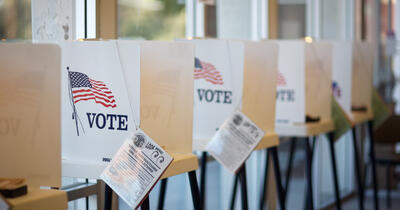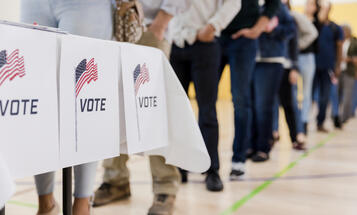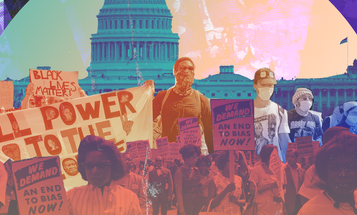
Congress Must Pass the Freedom to Vote Act to Advance Racial Equity in Our Democracy
Congress must act swiftly to put transformative pro-democracy legislation at the top of the agenda for the Biden Administration.

*The Freedom to Vote Act (an updated version of the For the People Act) is still awaiting passage in Congress. These resources and research make the case for why we need voting rights reform.*
Democracy champions in Congress and President Biden have a once-in-a-generation opportunity to pass transformative pro-democracy legislation that can protect Americans against an historic wave of racist voter suppression laws, put voters rather than big donors at the center of our democracy, and help Black and brown communities exert the power of America’s one-person, one-vote principle.
This fight is urgent and existential.
This fight is urgent and existential. Big money is fueling vote suppression based on the Big Lie that the 2020 election was stolen from Trump. Our leaders must not let the Jim Crow filibuster stand in the way of the rescue package our democracy desperately needs.
Demos has advocated for many of the reforms in the For the People Act for years. Here is a catalogue of some of our recent analyses that reveal the effect passage of For the People would have on expanding political power in Black and brown communities.
- Black and brown communities lead on small donor democracy / public financing of elections. New case studies from Baltimore and Seattle show how communities of color are leading the way on pushing back on big money and tearing down barriers to entry, because organizers recognize boosting small donors is about equity and power, not just a “good government” concern.
- Same Day Registration: How Registration Reform Can Boost Turnout Among Black and Latinx Voters. Same Day Registration (SDR) is a critical part of building an inclusive, multiracial democracy. This new research examines data across three federal election cycles and in states around the country to explore SDR’s role in closing racialized registration and turnout gaps and boosting turnout among Black and Latinx communities. In nearly every case we studied, turnout among Black and Latinx voters is higher in SDR states than in non-SDR states, in some cases by a significant margin. This research speaks to the critical importance of keeping SDR in any federal democracy reform package aimed at advancing racial equity in our democracy.
- Unstacking the Deck: Empowering Small Donors to Break the Vicious Cycle of Racial Exclusion in our Democracy & Economy. This accessible, bulleted fact sheet explains how our big money campaign finance system translates centuries of economic discrimination against Black and brown Americans into political marginalization, and how the small donor empowerment provisions of the For the People Act can help build an inclusive, multiracial democracy where the strength of our voices doesn’t depend upon the size of our wallets.
- The Impact of Select H.R.1/S.1 Policy Changes on Black and Brown Political Power. This analysis examines several key reforms included within H.R.1’s voting rights and campaign finance sections, showing how each will advance racial equity by removing barriers erected to keep Black and brown communities from democratic participation. Our analysis looks at automatic voter registration, same day registration, rights restoration, voting by mail, small donor public financing for elections, and more.
- The For the People Act (H.R.1/S.1) is A Racial Justice Bill. The For the People Act addresses the longstanding racist exclusions in our democracy with policy solutions that are proven to advance racial equity. This piece explains why we must talk about the For the People Act in race-forward ways and provides talking points and tips for how to do so.
- Written Testimony to the House on H.R.1, the For the People Act. Demos Director of Legal Strategies Chiraag Bains testifies to Congress on why H.R.1 is a visionary bill that can transform our democracy by addressing the deep political, racial, and economic inequalities that hold us back.
- Demos letter to Congress in support of H.R.1. Demos President Sabeel Rahman lays out the urgent need for this racial equity package and calls on Congressional leadership to pass H.R.1 first thing in the 117th Congress.
- Stacked Deck: How the Racial Bias in Our Big Money Political System Undermines Our Democracy and Our Economy. This report examines the racial bias inherent in our big-money political system, details Demos’ policy recommendations for making government more responsive to all people, offers case studies detailing the real-world impact of money in politics on people of color, and identifies opportunities to shift power from wealthy interests to all voters. We’ll be releasing an updated version of this report in the coming weeks.
- Whose Voice, Whose Choice? The Distorting Influence of the Political Donor Class in Our Big-Money Elections. We use original analysis of campaign finance data to uncover the demographics and policy preferences of the donor class that dominates political spending, shedding light on why money in politics is distorting our democracy in favor of economic elites, particularly wealthy white men.
- Universally Accessible and Racially Equitable Vote By Mail. With more Americans voting by mail than ever before in 2020, it is vital to ensure that vote-by-mail systems are more accessible and racially equitable. In this brief, we lay out best practices for making voting by mail work better for Black and brown, and indeed for all, Americans. H.R.1 harnesses the lessons of the 2020 elections and incorporates many of these recommendations to significantly strengthen vote-by-mail systems nationwide.
- End the Filibuster: How a Relic of Jim Crow Could Block Our Progressive Agenda. The filibuster is a racist remnant of a Senate designed to entrench white minority rule. It undermines organizing, participation, and electoral victories fueled by Black and Brown communities. And, unless we get rid of it, it will almost certainly block passage of H.R.1 / S.1 and other progressive priorities in Congress.
- 2020 Primary Election Analyses:
- COVID-19 Silenced Voters of Color in Wisconsin. This analysis of 2020 primary election data shows how COVID exposed the flaws in our current election system and disproportionately disenfranchised Black and brown voters in Milwaukee. It offers recommendations for strengthening vote-by-mail systems, so they are more accessible to Black and brown voters.
- Democracy Means All of Us: How to End the Chronic Silencing of Black and Brown Voters in New Mexico. This analysis, conducted with our partner Organizers in the Land of Enchantment (OLE), examines turnout data for the June 2020 primary election to understand how the intersecting barriers of COVID-19 and racist voter suppression schemes affected New Mexicans’ ability to participate in elections. We find Black, Native, Latinx, and Asian American voters all have less access to democracy in New Mexico.




